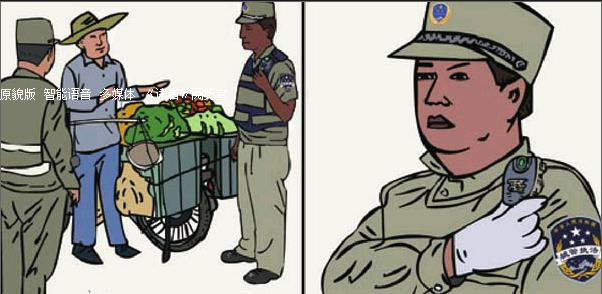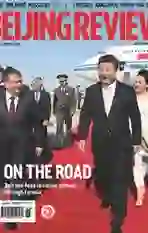How Can Appropriate Law Enforcement Conduct Be Ensured?
2016-07-12

Chinas urban management officers are responsible for keeping public spaces clear of unlicensed traders and in orderly condition for the traffic and public hygiene. In recent years, however, clashes between these officers and vendors in cities across China have been widely reported, and the law enforcers have earned themselves a negative image overall for sometimes acting violently when performing their duties.
This state of affairs, however, could take a turn for the better. In Zhengzhou, capital of central Chinas Henan Province, the urban management authority began this month to broadcast its officers law enforcement activities live online. The intention is to make their conduct open to public scrutiny to reduce public misunderstandings.
While the clashes that occur between urban management officers and unlicensed vendors are not necessarily the fault of the former, the broadcasting of live images would encourage both the officers and traders to act in accordance with the law, as transgressions will quickly be seen by a multitude of people nationwide.
The plan has been well received by the public, who applaud the transparency and openness brought by the live broadcasting of urban management work. It should go a long way to ensuring that law enforcers act appropriately to avoid public criticism, while at the same time acting as a deterrent to unlicensed traders.
Concerns have been raised, however, that the display will be selective and, therefore, present a picture not fully objective.
Good innovation
Liu Zhen (Anhui Daily): In the past, casual photographing, let alone live broadcasting, of urban management work by onlookers was often roughly stopped by the officers.
Urban management authorities keep saying that they are going to improve law enforcement methods and also the caliber of law enforcers. Urban management officers are ordinary people who dont want to be involved in violent clashes every day. Sometimes they risk their lives while carrying out their job. They dont want to be labeled as rude and inhuman. There is no lack of attempts to improve their work style. A complete change would be difficult to attain in a short period of time. The live broadcasting intends to present the whole law enforcement process to the public. This is a breakthrough in the effort to innovate new urban management methods.
With live broadcasting, abuse of power or wrongdoings will be seen by observers. Who would dare to use violence before so many people? This kind of public supervision will undoubtedly force urban management officers to mind their behavior. When they behave properly, we can expect to see growing trust and positive interaction between law enforcers and breakers.
The live broadcasting provides the best means of proving ones innocence. Without video recordings, when clashes break out, street traders tend to win more sympathy than urban management officers, as they are looked upon as being in a relatively disadvantaged position. People feel indignant about violent law enforcement, but they neglect the fact that urban management officers also face all kinds of danger that may arise from the violent acts of some unlicensed vendors.
It is acceptable to ask for civilized law enforcement, but this should be based on facts. Live broadcasting can provide the public at large with immediate, complete and genuine images. It will offer supervision over law enforcers and, at the same time, a way for them to prove their innocence when controversies arise. The more open and transparent the practice is, the more it protects both sides.
Live broadcasting can also help the management of street traders. When shown recordings of unlawful activities, or when subject to public criticism for illegally occupying public spaces, most unlicensed traders will confess their wrongdoing and correct it immediately. If traders are found to be misbehaving, the public will put them under pressure. This will have an even greater impact and be more effective than confiscating their goods and imposing fines. They will change their behavior, which will help improve the urban environment.
Zhengzhou is not alone in exploring new approaches in urban management. This April, urban management officers in Xuanwu District in Nanjing of Jiangsu Province began to use aerial photography to record their law enforcement activities. In the Information Age, when civilized law enforcement is widely expected, innovation in urban management practices can make the work more efficient and effective.
Wang Liping (www.eastobacco.com): Broadcasting the law enforcement process live on the Internet makes it possible for the vast number of Internet users to know clearly what is happening. This is a good attempt to improve urban management.
The recent years have seen too many clashes between unlicensed vendors and urban management officers. These officers are often seen as overbearing and rude. The lack of restrictions on, and effective supervision of, their behavior often leads to violent law enforcement.
The fact that urban management authorities have agreed to make their work open and transparent to the public implies a commitment to carrying out the work in a more civilized way in the future, as they will be subject to public supervision.
Unlicensed traders, meanwhile, knowing that they will also feature in broadcasts, will try to correct their mistakes and cooperate with urban management officers.
Live broadcasting the work of urban management officers, therefore, is a recipe for eradicating stubborn problems such as violent law enforcement and violent resistance by unlicensed traders. Consequently, we can expect to see a higher level of urban management and a better image of urban management officers.
Li Li (www.china.com.cn): Nowadays, some law enforcement departments feel offended when people photograph them working, and they even resort to violence toward the photographers. So, as Zhengzhous urban management officers begin to broadcast their work live online, they are throwing themselves into the limelight.
Live broadcasting can reach a wide audience. The whole process is presented clearly to the audience, and when disputes arise, the video can provide hard evidence.
Law enforcement should be able to withstand the test of being observed. Broadcasting such activities live online marks a great leap forward.
Faced with mounting criticism from the public and misunderstanding of their work, urban management officers in Zhengzhou came up with the idea of live broadcasting as a way to improve their work style. Apart from restraining urban management officers, the broadcasting will also serve to restrict street traders behavior.
Open and transparent law enforcement should be ensured by improving the oversight system. When urban management is made subject to effective public supervision, who is right and who is wrong will be clear.
Doubts remain
Wang Juan (www.eastobacco.com): The live broadcasting has been put into practice to push forward transparent law enforcement, so that urban management can be better understood. Whether it is the proper approach, however, remains to be seen.
After all, its involvement of so many people and all kinds of resources will be expensive, and so live broadcasting every encounter between urban management officers and street traders will be impossible. It is likely that only some selected cases will be broadcast online, and such filtering may mean the presentation is not very convincing or fair.
As the cameras are in the hands of the urban management officers, they are already prepared for the live broadcasting. By contrast, street traders are not ready, and so they may feel uneasy and respond inappropriately.
Live broadcasting is not the most important thing. What really matters is the removal of rude law enforcement practices in places where cameras cannot reach. The public only hopes urban management officers act in a civilized manner and in accordance with the law.
Tao Liyang (www.jxnews.com.cn): Conflicts between urban management officers and unlicensed traders have long existed. To broadcast interactions between the two sides live online can deter both law enforcers and traders. But this is still not a fundamental way of solving the problems between the two groups.
Moreover, even unlicensed traders legal rights must be well protected. However, exposing law enforcement activities to the public might infringe upon the privacy of the traders involved.
It is important to ensure civilized law enforcement by urban management officers, even if that means opening up the whole process to public inspection by live broadcasting. At the same time, while this innovation in law enforcement is welcome, it must be prevented from becoming a publicity stunt.
